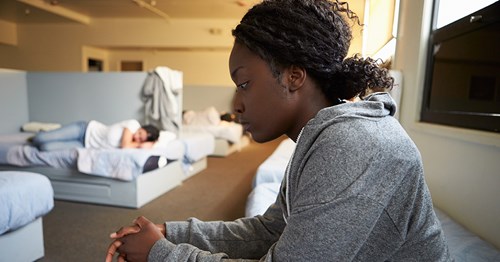RISE looks at recent headlines concerning social determinants of health (SDoH).

HHS releases guidance to prevent homelessness among young adults exiting foster care
The U.S. Department of Health and Human Services (HHS), through the Administration for Children and Families (ACF), announced this week new guidance intended to better support young adults who have left foster care secure stable housing.
The guidance was made to Runaway and Homeless Youth (RHY) grant recipients in relation to the U.S. Department of Housing and Urban Development’s (HUD) Foster Youth to Independence (FYI) program, which aims to help individuals ages 18 to 24 who have transitioned out of foster care and at risk of homelessness.
“Every person in this country deserves a safe place to call home – especially young and vulnerable youth who are transitioning from foster care to independent living. Ensuring that affordable housing, and other critical services, are available is a big step in the right direction," said HHS Secretary Xavier Becerra in a statement. “Preventing and ending homelessness requires a collective effort to understand and address its root causes such as housing affordability, substance use disorder, and mental health. The Biden-Harris Administration is committed to ending youth homelessness, and we will continue to make it easier to access resources needed to change lives.”
Approximately 20,000 youth exit foster care each year, according to HHS, and due to their increased obstacles to securing housing, are at a greater risk of becoming homeless. The new guidance provides grant recipients with information about the FYI program as well as ways they can partner with child welfare agencies to help vulnerable young adults.
HHS grants $55 million to tribes and tribal organizations
The agency announced that through the Indian Health Service (IHS), it has awarded $55 million to 15 tribes and tribal organizations as part of the Small Ambulatory Program, which works to expand access to various outpatient services for the Indian health system. The grant funding will be used to offer new services, expand existing services, and improve outdated facilities.
“Tribal partners need access to culturally appropriate, quality health care, including preventative services for chronic diseases. To help meet that need, HHS is investing in the construction, expansion, and modernization of small ambulatory health care facilities,” said HHS Secretary Xavier Becerra in the announcement. “For nearly a quarter-century, HHS has been partnering with tribes and tribal organizations to ensure all communities have access to the care they need and deserve. Our ongoing support for the Small Ambulatory Program ensures this vital work keeps making a difference.”
Ninety-five percent of tribally operated health care facilities provide primarily ambulatory services, HHS said, such as preventive care for chronic diseases such as diabetes. The agency also underscored the value of tribes and tribal organizations operating ambulatory care settings to ensure culturally appropriate, quality health care.
CMS introduces model to advance integration in behavioral health
HHS, through the Centers for Medicare & Medicaid Services (CMS), announced on Thursday that it will introduce a new model to test approaches for addressing the behavioral and physical health, as well as health-related social needs, of people with Medicaid and Medicare.
The Innovation in Behavioral Health (IBH) Model’s goal is to improve the overall quality of care and outcomes for adults with mental health conditions and/or substance use disorder by connecting them with the physical, behavioral, and social supports needed to manage their care. The model will also promote health information technology (health IT) capacity building through infrastructure payments and other activities.
The Center for Medicare and Medicaid Innovation (CMS Innovation Center) will test the model. Under IBH, community-based behavioral health practices will form interprofessional care teams consisting of behavioral and physical health providers, as well as community-based supports. This new model supports the President’s mental health strategy and implements an action item in the HHS Roadmap for BH integration.
Through interprofessional care teams, people will experience an integration of services that will bridge the gaps between physical and behavioral health. The model enables a “no wrong door” approach, meaning that regardless of how patients enter care, they will have access to all available services. Through this practice, IBH also aims to reduce overall program expenditures. The model will launch in fall 2024 and is anticipated to operate for eight years in up to eight states. CMS will release a Notice of Funding Opportunity for the model in Spring 2024.

